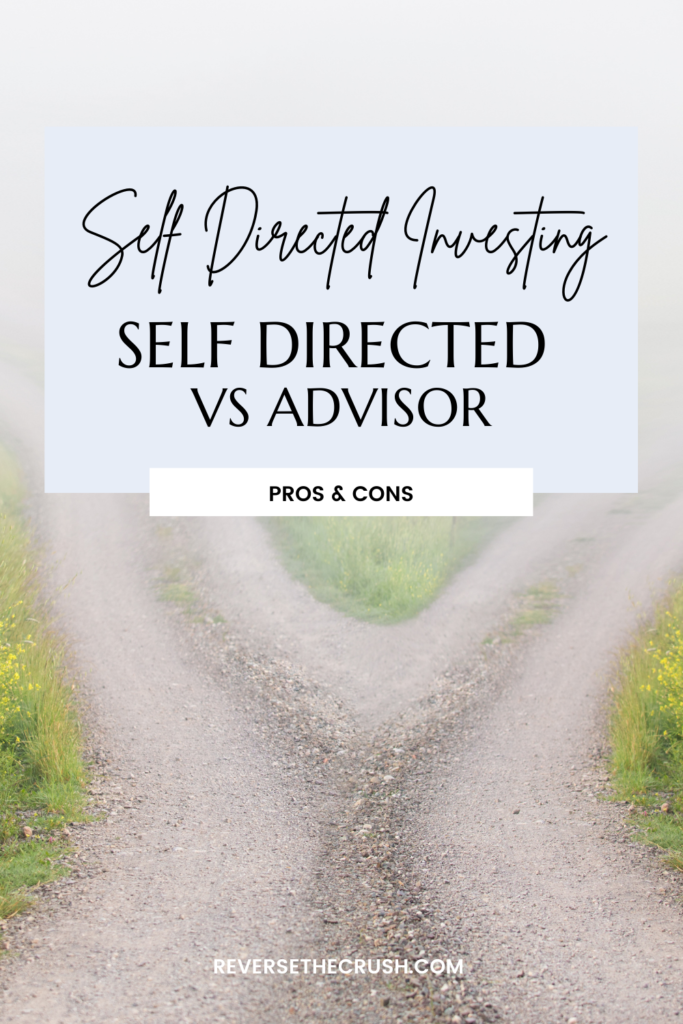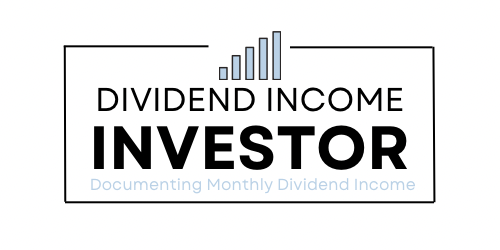Self-directed investing: What is self-directed trading? Looking at the pros and cons of managing your own investments vs being managed by an advisor. This post contains affiliate links.
Because of the internet, investors now have the option to manage their own money.
The days of driving into town to meet up with a financial advisor are numbered. This isn’t 1950 anymore.
Even banks acknowledge this. That’s why many of them are starting their own online banks. More and more services are offered through mobile apps.
They see how the next generations want to bank. The writing is on the wall.
But it’s not only limited to banking—it’s happening to the investment industry too.
The rise of zero-commission brokerages, cryptocurrency, reddit forums, more transparent investors, and self directed accounts have the investment industry looking different.
The people have spoken and they want more self-directed investment options.
In this article, I will look at what self-directed investing is and review the pros and cons of self-directed investing.
Let’s dive in to what it means to be a self-directed investor.
What Is Self-Directed Investing?
Self-directed investing means you make your own investment decisions and trades.
If you self direct your investments, you don’t rely on a salesperson financial advisor to make trades for you.
Furthermore, self-directed investors operate their own investment accounts. They open up self-directed investment accounts at discount brokers to be able to buy and sell their own investments.
Instead of meeting some fancy person with an overpriced suit and watch, a self-directed investor signs into their brokerage account on their personal computer at home. They access it on the internet, and they are free to transfer money to or from their account as they please.

Self Directed Vs Advisor
To put it bluntly, the main reasons to go with a financial advisor are social.
If you want control over your money, the lowest fees, and a chance to earn to superior returns, self-directed investing is the superior option.
Below are the pros and cons to support my belief.
Pros Of Self-Directed Investing Vs Financial Advisor
Let’s begin by looking at the pros of managing your own investments.
Lower Fees
The biggest advantage of self-directed investing is lower fees.
If you self direct your own investments, typically, you only have to pay a commission fee per trade.
For example, if you use Questrade as your broker, you will pay $4.95 per trade.
Better yet, you might not even need to pay a commission at all with the rise of zero-commission brokers. If you invest with WealthSimple in Canada, you don’t have to pay commission at all.
The only cost you will incur is if you invest in index funds. For example, if you invested in an S&P 500 index fund like VSP, the management fee is 0.08% and the MER is 0.09%.
In comparison to a financial advisor, these fees are extremely low. It’s really not even close.
A financial advisor might charge 1.5% of the total assets they manage.
So, if you invest $100,000 with a financial advisor, they will take $1,500 per year.
Meanwhile, if you invest $100,000 into a low-cost index fund at a zero-commission brokerage, your total fees could be as low as $170 per year.
Furthermore, this cost advantage is scalable if you invest in stocks. Because your commission fees don’t increase because you have more money to invest. The trades still cost the same.
But with a financial advisor, the more money you have, the more they make.
Potential For Higher Returns
You would think that you would get superior returns with a financial advisor.
However, that’s definitely not the case.
In fact, nearly 90% of financial advisors underperform the market.
In other words, if you bought an S&P 500 index fund like VSP, you would actually outperform 90% of advisors.
It would cost you far less and you would make more money.
Of course, if you pick your own stocks and you pick the wrong ones, you could underperform the market.
But if you select the right stocks, you could end up beating the market.
In short, you have a better chance of beating the market if you self direct your investments.
Control Over Your Money
When you invest with a financial advisor, you basically write them a cheque or wire over your money.
Then, if you want your money or if you come across an investment opportunity, you have to contact your advisor to access it.
Because your advisor makes money off how much you have invested, they will try to convince you not to withdraw your money. And if you want to invest in something that is not on the approved list, they will not be allowed to invest in it.
Alternatively, if you self direct your investments, you are completely in control of your hard-earned money.
It does require some discipline to keep your funds invested, and you have to complete your own due diligence on what you want to invest in. But ultimately, this means you are in control, not some salesperson advisor.
Of course, this could also be viewed as an advantage for some people that otherwise spend frivolously or make bad trades.
Saves Time (if you own index funds)
I will admit that investing requires a lot of time.
If you want to invest in individual stocks, you have to be willing to do a lot of research. It’s the only way to become a good investor.
But if you are a mutual fund or index investor, being self directed saves you a lot of time.
You simply open the investment account and invest regularly. There’s nothing else to do.
Less Meetings With Salespeople In Suits
If you are an introvert like me, you despise meetings.
Most meetings are a waste of time, and most of the points that are discussed in meetings could easily be said in an email. Usually, meetings are an excuse for extroverts to avoid work.
Plus, there are already enough meetings in life—job meetings, meetings with car salespeople, and meetings with mortgage salespeople.
Why add more meetings to your life? Why add another salesperson?
Imagine it’s Friday evening and you have to meet up with some salesperson in a suit that wants to sell you on investing.
If you self direct your investments, you will have less meetings with salespeople in suits.
Your Money Is Managed By Someone Who Cares About Your Money
The only person who truly cares about your money is you.
When you send money over to your advisor, you are basically buying someone else a new suit or watch.
Although there are some good advisors that care, most of them are superficial people that just want to move money from your pocket to theirs.
They will brag about getting your money to their friends, and they look at you as just another sale.
But if you self direct your investments, you can be certain that your money is in the hands of someone who cares.
Cons Of Self Directed Investing Vs Advisor
Everything has tradeoffs, including self-directed investing.
Here are the cons of managing your own money:
Social Connection
If you are an extrovert, you might like having a financial advisor.
In fact, it might be a bragging point if you are a superficial person.
When you go to parties or when you are talking investments with friends, you can say things like “my financial advisor recommended this.”
It makes you sound smart and sophisticated.
Otherwise, maybe having a financial advisor is an opportunity to make a friend. Perhaps it’s someone new to talk about watches, suits, and cars with.
Reassurance During Corrections
I will admit that a lot of people do need advice.
Being an autodidact is rare.
And most people do not want to put in the time to understand their investments.
When downturns happen, financial advisors offer emotional support and reassurance.
The fact that they don’t want you to withdraw investments, because they make money off you, is actually a good thing.
During scary market corrections, they spend most of their time advising clients not to sell.
In the long term, this is beneficial for most investors.
Saves Time (if you want to own individual stocks)
If you are a high income earner with a demanding job, you likely do not have the time to research your own stocks.
If you don’t want to just buy index funds, a financial advisor can be a good way to save time.
Of course, you might underperform the market, but it’s better to earn 7% than it is to earn 1% on a savings account.
In this case, paying a 1.5% fee might be worthwhile to save time and for reassurance.
Other Financial Advice
Financial advisors can also be beneficial for other advice, such as insurance, wills, tax planning, money management, beneficiaries, and account choices.
If you don’t want to put in the time to educate yourself, an advisor can be valuable.
Personally, though, I think a good accountant is more valuable. They can offer better advice for tax planning.
And for wills, all you need is a good lawyer.
But I will admit that some financial advisors can be helpful for other advice besides investing.

Self-Directed Investing – Final Thoughts
In summary, self-directed investing means you manage your own investments.
You don’t rely on an advisor to make trades for you.
Although advisors are beneficial in some ways, most of the advantages are social and traditional.
In the internet age, it’s entirely possible to self direct your investments and earn superior returns for lower costs.
It really comes down to if you want to put in the time to educate yourself.
But really, what’s more important than your money?
You went to school to be able to have a good job, and you go to work every day to make money.
So, why not put in the time to learn how to manage your own money as well?
Frankly, if you don’t have the time do manage your own money, you might want to learn about financial independence so you can reverse the crush.
Related Articles On Investing
S&P 500: How To Buy It And Turn $10,000 Into $420,000
Are Financial Advisors Worth It? 9 Reasons Why They Are Not
I am not a licensed investment or tax adviser. All opinions are my own. This post may contain advertisements by Monumetric and Google Adsense. This post may also contains internal links, affiliate links to BizBudding, Amazon, Bluehost, and Questrade, links to trusted external sites, and links to RTC social media accounts.
Connect with RTC
Twitter: @Reversethecrush
Pinterest: @reversethecrushblog
Instagram: @reversethecrush_
Facebook: @reversethecrushblog
Email: graham@reversethecrush.com


 Podcasts On Money And Personal Finance To Get Your Money Right
Podcasts On Money And Personal Finance To Get Your Money Right
